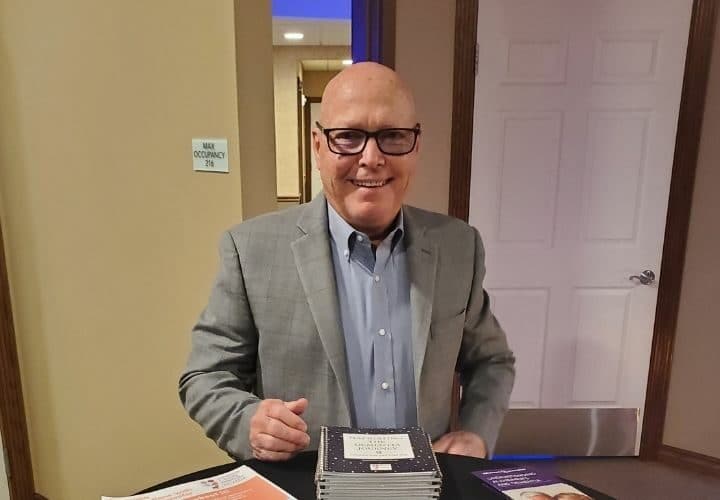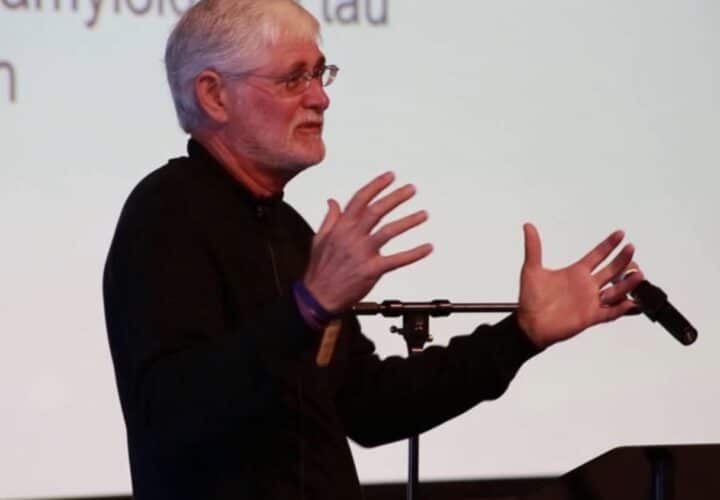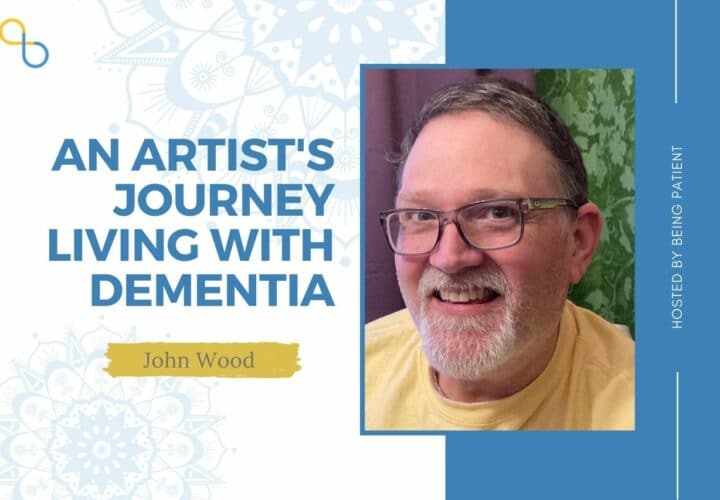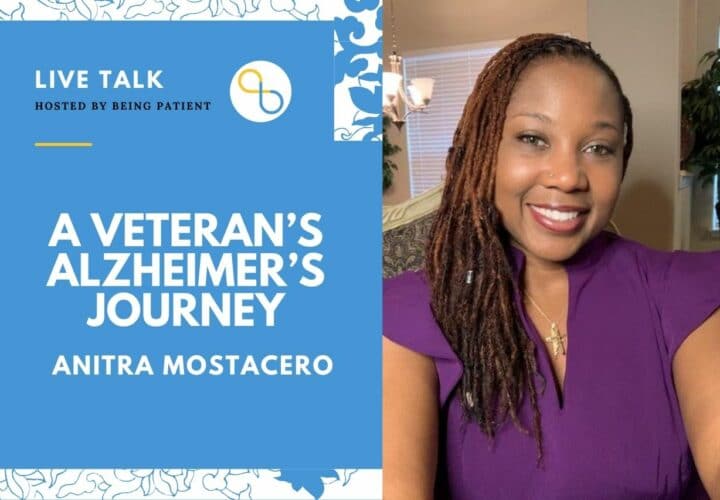Retired Air Force engineer Chuck McClatchey, who was diagnosed with Alzheimer’s at the age of 61, shares his story.
Desert Storm veteran Chuck McClatchey, 69, wants people who’ve received a dementia diagnosis to know that they are not alone in their journey. McClatchey’s own diagnosis of early-onset Alzheimer’s in 2014 upturned his life, and opening up about the challenges that he faced along the way, he says, has not been easy. But over time, by sharing his story, by finding the positives in his life, and by linking arms with others impacted by dementia, he has come to learn that there is so much to live for in this new version of life.
As part of our LiveTalk series, McClatchey sits down with Being Patient to share his approach to adapting to a diagnosis of Alzheimer’s or dementia, his own early symptoms of the disease, and how he has found hope and inspiration while living with Alzheimer’s.
Being Patient: Tell us a little bit about your professional background.
Chuck McClatchey: I was born in California and entered the Air Force in 1971. I became an engineer on C-141 transports, which is a big 4-engine jet. I was able to fly 1,000 hours. I had to fly to about 37 different countries, every continent, did an air drop in South Pole, flew in Desert Storm, then retired right after Desert Storm and went to work for the Arizona Transportation Service. It’s a growing field called ITS, intelligent transportation systems. It’s the big black message boards along the freeway and ramp meter.
I developed a maintenance program for the entire Phoenix metropolitan Area and got promoted to operations superintendent for the State. I had five different traffic groups around the Phoenix area and about a $25 million budget.
I retired in 1993 and thought I had my dream job in Dallas as a superintendent for a construction company. That’s when I started having my issues with memory and started forgetting things I used to teach.
Being Patient: What was the final straw for you?
Chuck McClatchey: We call them our aha moments. After I left the construction company, I went to work for Lowe’s’ plumbing and electrical department. I was still having memory issues and I was pretty frustrated.
One night, Bobbie brought home a little red desk for me to put together, which should have taken probably about 30 minutes. Well, here I am an hour later, trying to put it together. It won’t go together right. I get pretty angry at myself and said, ‘Well, I’ll just finish it tomorrow.’ That’s when she finally started telling me the things that I was doing around the house.
She would leave and ask me to do a couple tasks. I might get one but not the either. I would go start doing something else. She said, ‘I really think that you need to go get checked.’
Bobbie’s my wife. We’ve been together now for about 13 years. She’s a former military wife. Her husband was in the Air Force for 22 years. He passed away about four years before I met her, so we’ve been on this journey together. We’re very open and honest with each other, which helps.
Alzheimer’s wasn’t in my family, so that wasn’t anything that I was even thinking of. I went to my primary care doctor and I was extremely fortunate. He sent me to a specialist in Fort Worth that specializes in dementia. I went through all of the neurocognitive testing and MRIs and PET scans. I still remember the day [the doctor said], ‘Your brain has shrunk. Your fissures in your brain are twice the size as normal. You need to go home and get your affairs in order because you have early-onset Alzheimer’s,’ and basically, ‘I’ll see you in six months.’ That was my diagnosis.
I was 61 when I was diagnosed. But looking back, I was having issues probably four or five years prior to that. I didn’t realize what was going on. I used to love poker. I ended giving up poker because I couldn’t really remember all the cards and the plays on the table. I almost gave up golf because I would not remember what the score was.
You get to a point where you are tired. I’m getting older. There’s this. There’s that. You always make those excuses for what’s going on, until you get to a point where you have the aha moment.
Being Patient: What were your reactions to your diagnosis?
Chuck McClatchey: I had a very, very difficult time. I thought [I would be in] a nursing home in a year. All those things just kept running through my mind, and I ended up having severe panic attacks and really bad anxiety. I ended up going to a therapist for a while. That really, really did help. This went on for about six months.
One day, Bobbie could see I was having a bad day and she goes, ‘We need to sit down. We got to talk about this. You got to cut this out. This isn’t who you are. You’re not somebody that does this,’ and she was right. But I think in those moments, you forget who you are.
Once we decided that … we were going to fight back, everything seemed to fall in place. We found a support group. It was amazing walking in that first time and seeing other people there that had the disease for five, six, seven, 10 years. For the first time since my diagnosis, it was like, ‘Oh wow, maybe I’m not going to be in a nursing home in six months. Maybe I can make it through this.’
The leader of the group asked me if I would talk at a caregiver conference. That was the first time I’d ever talked in front of a large group. My fear was, ‘Well, what am I going to tell them? They’re living it, and I don’t have any answers.’ I gave my presentation, and I was amazed because after I finished, there was probably 15 to 20 people that came up [to me].
I finally realized that people don’t talk about Alzheimer’s because they’re so afraid of it. The [misconceptions] and the presumptions really paint a black hole. It takes a lot to get yourself out of that hole when nothing around you gives you hope. That’s brought me onto this path.
When I first got diagnosed, I looked it up on the internet and my life was supposed to [last] three to five years. That was eight years ago. I think people need to understand that it’s not an immediate death sentence, that you have a long live life to live. You may change a little bit, but it still entitles you to have a life to live, to love, to learn, and to pass onto other people.
I’ve always said that dementia is a family disease because it’s going to affect every single member of the family. When your family can talk to you about what’s going on, and you can sit there and talk with them with a smile on your face and say, ‘Well this is what’s happening,’ they’re not so afraid … If you don’t understand what’s going on, it can just create so much stress.
If I do something wrong, then it’s not me, it’s the disease … We actually named my disease and the little guy’s Chucky (Chuck’s a gorilla doll of 35 years). That’s actually a representation of my disease. He goes with me every time I travel or go talk. He goes with me because he is with me. It’s a point that when [something is] going wrong, [you] put it on that.
I’ve talked to so many people that have a hard time and frustration. They can’t really handle not being able to do what they used to do. I tell them, ‘You need to just concentrate on what you can do, pursue what you can do, and not dwell on what you can’t do. To meet this disease head on, you have to understand what’s happening to you.’
Being Patient: You mentioned that you can forget who you are. What do you mean by that?
Chuck McClatchey: It was like I got hit right in the chest with a four-by-four. All of a sudden, everything that I had planned and was planning for was out the window. I would not be able to take care of my family. I would not be able to take care of my house. That’s what fills your head. With me, I couldn’t wrap around exactly what was happening.
It really strips everything away from you and you get down to the point where I was at: that every day is doom and gloom. You have to stop, and you almost come to a crossroads. You can either take the positive side and live your life, or you can take the negative side and just give up. I’ve seen people that have given up and it is the saddest sight that you will ever see. You can see on their face if they’ve just given up.
“You can either take the positive side
and live your life, or you can take
the negative side and just give up.”
I was going to fight this every way that I knew how. That is what drove me to do what I do and [remember] who I was, because it takes everything away except what your core values are and who you are inside. All the money you have, all the prestige you have, this disease doesn’t care and it’s going to affect you extremely bad.
We have to make that decision for us and for our families that we’re going to fight this and we’re going to fight this together. We’re going to bring everybody along with us.
The more you bring them in, the less stress in the family it’s going to be, because everybody knows what’s going on. If they can see you laugh about some of the things you do, then they don’t have that stress.
Bobbie and I were in the store, and she [was checking the] rye bread. I said, ‘Bobbie, what is jellyfish rye?’ She gave me a really funny look and said, ‘What are you talking about?’ I said, ‘The back of the packet says jellyfish rye.’ The end of the loaf folded over, and [in] my mind, it just said jellyfish. Well, it was Jewish rye. But we were able to laugh about it, and it just takes that stress away. We’re not doing these kind of things on purpose. Things are going to happen and what do you do? You get back up, regroup, and go at it again.
I think you’ve seen my podcast This Dementia Life. I co-created one podcast with a doctor talking about clinical trials. It was really good, and I forgot to record it. I had to go back to the doctor again and asked him would he redo it. I told him exactly what happened. He was understanding and we redid it.
Things like that are going to happen. One of the worst things to do is [to] keep somebody from trying things. Number one, you have to understand your limitations and to keep doing the things you want to.
Being Patient: Your presentation at the caregivers’ conference must have been a jumpstart for you as an advocate.
Chuck McClatchey: The aha moment for that was when I finished, people wanted to know more. That set things in motion. Two years later, I was selected to the 2016 National Early-Stage Advisory Group and went around for the Alzheimer’s Association to conferences and conventions. It was just something that I realized that I really did enjoy. I enjoy talking with people.
When I was in New Mexico, I talked at the Senate twice. Here in Nevada, now I’m a member of the Governor’s task force on Alzheimer’s disease. I do a Zoom every Monday from 10 to 11:30 for people living with dementia through Dementia-Friendly Nevada, with Dr. Jennifer Carson out of the University of Nevada, Reno. We have probably 18 to 20 people there every week.
Being Patient: Any last thoughts that you would like to add?
Chuck McClatchey: Whoever out there has questions about dementia, just do research on it and understand what it is.
Also understand that you’re not alone. The person with the disease is not alone. The care partner is not alone. There are thousands of people out there going through the same thing you are. We can help each other and make that journey a lot less stressful.
“Always remember that you are not alone in this battle.
You have a whole army behind you. We can learn
from each other. We can support each other.”
Always remember that you are not alone in this battle. You have a whole army behind you. We can learn from each other. We can support each other. As a group, we can fight this as much as we can. They’re in the dementia family, and it encompasses everybody. We don’t care who you are. If you have dementia, then you’re part of our dementia family.
The interview has been edited for length and clarity.
Contact Nicholas Chan at nicholas@beingpatient.com




My husband has just been diagnosed and I so enjoyed reading your EXPERIENCE.